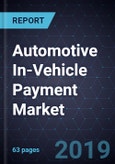In-Vehicle Payments From Various Use Cases Expected to Reach $3,500 Annually Per Car by 2025
As the in-vehicle eCommerce market gains traction in the automotive space, it makes way for the development of an entire retail ecosystem across passenger vehicles. With payments being the end-point of a commerce network, the automotive industry will have to partner with service providers to pick-up on connected services to transform the commute time into a useful routine for consumers by introducing in-vehicle payments (IVP) an attribute that works hand-in-hand with the implementation of in-car payment platforms; in the future, such technology will lead the development of every aspect of in-vehicle connected-car services.
The automotive IVP market expects payment partnerships and acquisitions to broaden opportunities for technology/service providers, retail merchants, payment aggregators, and major card network providers. OEMs will strategize with market participants to build partnerships in the payment industry, while card network providers create various solutions applicable in-car, considering IVP to be an additional transactional channel. It is essential for OEMs and technology providers to establish the right strategic partnerships with Tier-I suppliers, platform providers, retail merchants, and payment providers to guarantee the best returns on their investments. The North American in-vehicle payment industry is growing rapidly through payments across their connected service platform; while Europe covers merely 1.5% of its automobile market with IVP service availability.
Autonomous and self-driving cars steer the future of the automobile industry and have offered an array of applications for payments within the vehicle for services such as eCommerce, movies, restaurant reservations, grocery purchases, mobility services, connected service upgrades, and feature-on-demand payments. These services are offered straight from the vehicle’s display unit also encompassing advanced technological implementations, such as AI and machine learning, digital voice assistants, biometrics, gestures, and AR applications in the future.
This analysis presents an overview of the automotive in-vehicle payment (IVP) industry and forecast. It describes the various modes of payments and the payment networks involved; OEMS and technology-related enhancements that the industry is pursuing to deliver in-car eCommerce; and transformations in the connected in-car services segment.
The details presented in the insight focus on:
- Growth analysis and future opportunities of the market
- In-car retail ecosystem and payment parameters involved
- Key automotive IVP trends in terms of partnerships, market participants, and technology
- Use-case analyses in the industry
- Implementation of new business strategies for enhanced value delivery
- The market forecast and revenue opportunities for the future of automotive IVP market
- Key company profiles in the automotive payment industry
- Growth opportunities and strategic imperatives for the automotive industry
Table of Contents
1. Executive Summary
Companies Mentioned (Partial List)
A selection of companies mentioned in this report includes, but is not limited to:
- Daimler
- GM
- Hyundai
- Mercedes
- P97 Networks Inc.
- Tantalum Corp.
- VISA
- Xevo








